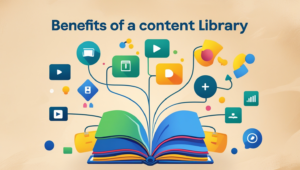Keywords: content writing, website content writer, seo content writer, blog post writer, web content writer
You know how people often think that SEO is all about the technical side, like doing technical SEO or building backlinks, Well, here’s the thing, the real NVP (Net Present Value) in SEO aren’t those who can handle the tech side, they are the ones who have mastered the art of content writing, because what matters to search engines the most, is a good piece of content, above everything else.
Table of Contents
ToggleFundamentals of Content Writing
So, we have talked about doing original research to create unique and trustworthy content and we’re going to build on top of that to help you to understand the true essence of a good piece of writing that grabs attention and engages people and makes them want to stick around.

I’m talking about the content that Google loves too. If you’ve been in the SEO world for a while, you’ll often hear SEO experts say that your content has to be the most comprehensive one that covers everything about the topic to rank at the top.
Comprehensive Content
Meaning, if the content of the topic at number 1, talks about topics A, C, D, F and H. The topic at number 2 talks about A, B, E and G. Position 3 talks about C and D. For you to rank at the top, you will need to talk about everything to be the most comprehensive piece of content.
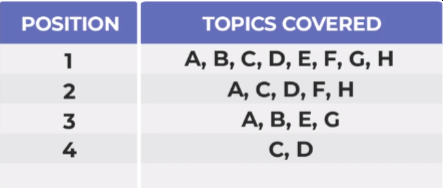
That’s why you often hear the advice to write massive 2,500 to 4,000-word articles. It was like a competition to see who fits the most words in a single web page.
But, here’s the thing, THE GAME HAS CHANGED.
Sure, being comprehensive is still important but, it’s not the most important.
Identifying Search Intent
What matters now, is how your content benefits the reader. People care about what they get from reading your article.
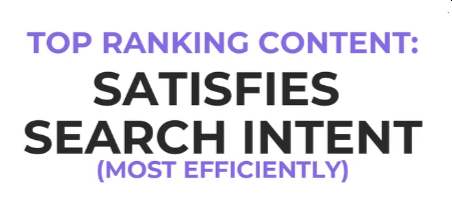
That’s where understanding Search Intent becomes super-important.
For example: someone searching for the keyword “Best WordPress Hosting”. There is content A that gives you tips at the top, “What it means by “Best WordPress hosting” then a list of WP Hosts. Compared to content B that immediately provides you with data from original research, they have a video that supports the original research and it show you which is the Best wordPress Hosting based on the data.
Which do you choose? Which do you think would benefit the searcher more? Most would say B because is cuts to the chase and answers the question directly. That’s the power of nailing the Search Intent.
A skilled website content writer plays a crucial role in content writing by crafting engaging and relevant material that enhances a site’s online presence.
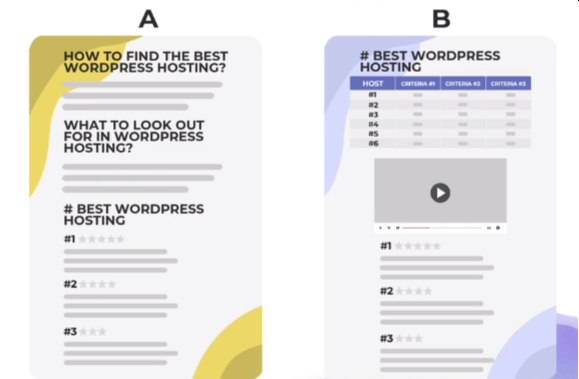
And, what about the searcher who has searched for the keyword “How to Choose the Best WordPress Hosting”. Given the same content A and B we can say that content A satisfies the Search Intent for the keyword because the searcher is not looking for the Best WordPress Hosting, they are looking for information.
So if i were the content creator for site B, I would write an article that tackles Best WordPress Hosting but add a section that talks about “How to Choose the Best WordPress Host for your Site”.
But, not as in-depth. Then, write another article that tackles the Search Intent: “Tips to Find the Best WordPress Web Hosting” which will be a more in-depth write-up. And have this content linking to the first with a likewise return link. It should have a sentence saying ” If you want to know which are the Best WordPress Web Host, check this page.” The old method was to write the most comprehensive content and most of the time, people will squeeze everything together. Most content writers forget that in every article you write, you can only serve one primary Search Intent.
If you don’t believe me, go to Google and search for the keyword “Best WordPress Hosting” and “How to Choose the Best WordPress Hosting” and you will see the top ranking Search Results are different.
Effective content writing involves determining the appropriate content length to ensure the message is clear, engaging, and tailored to the platform and audience.
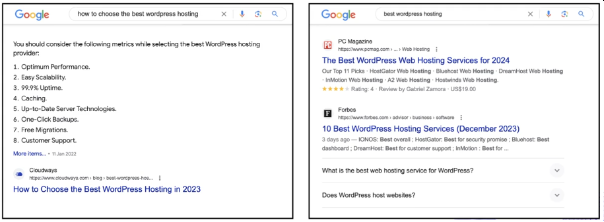
So, if you want to dominate search, you’ve got to tackle one search intent at a time. Not lump everything together just because everyone says so. In today’s world where attention spans are shorter, especially for written content. Your content must deliver what the searchers are looking for and fast. They land on your page and bam! They find exactly what they need.
Analyse Search Results
Now, let’s put some logical thought into how search engines will rank content. Picture this, a Web Page is sitting pretty at the top of the Search Results. Everyone is clicking on it. But, here’s the catch. They’re bouncing right back to the search engines and clicking on another search result. Why? Because the searchers are not getting what they need.
This is like a BIG flashing neon sign of search engines saying “Hey, this content might not be as helpful as we thought. It’s all about user behaviour. If lots of people are hitting on a page and immediately heading back to search for something else. It’s a clear signal that the content on that page isn’t hitting the mark on a particular search term.
And here’s the kicker, even if that article is the most comprehensive piece of writing, it’s not what people are looking for. What people really want, what they’re actually searching for, is immediate answers to their questions.
The content writing phase is a crucial step in the broader content creation process, ensuring that each piece resonates with the target audience and aligns with strategic goals.

It’s not just about how much you write, or how much knowledge you cram into an article. It’s about whether you are giving people what they are searching for, quickly and effectively.

Now that you know why the most comprehensive piece of writing might not be effective anymore. And you understand the importance of serving the search intent one at a time. I want to run you through a couple of old SEO concepts that don’t really matter now but might, potentially, hurt your site if you focus too much on them in the next lesson.
Content writing involves creating engaging, informative, and relevant material tailored for digital platforms, often crafted by professionals like website content writers, SEO content writers, blog post writers, and web content writers.
Understanding what is content writing is crucial, as it includes a wide array of formats such as articles, blogs, and product descriptions, all designed to meet the specific needs of online audiences.
Many businesses rely on content writing firms to produce high-quality examples of content writing that drive traffic and engagement. With advancements in AI content writing, tools are now assisting in generating tailored material, complementing traditional writing and content efforts by human experts.



